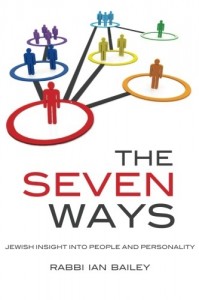How do Your Parents Relate to God?
A Beautiful Binary
I’ve found that people generally conceive of their relationship with G-d as the same as the relationship that they had with their parents. This leads people to view Gd in one of two extremes: as either very strict or very permissive. It’s important to conceptualize Gd as someone who is both very giving and forgiving, but who also wants us to improve ourselves and eliminate bad behavior. Gd is described as acting with both chesed and gevurah, “forgoing” and judging, respectively.
It takes time, of course, to change our conception. The things we learn in our youth are deeply ingrained in us.
It’s important to take ones relationships with Gd seriously, but to avoid drowning in neurotic obsession with being a so-far imperfect being; we have time to develop.
————————————————————–
Longer Version:
There is an interesting psychological phenomenon that I have observed in people. I’ve found that people generally conceive of their relationship with G-d as the same as the relationship that they had with their parents.
If someone had stern parents, he will view G-d as being stern and angry and as holding him accountable for every little thing he does – ready to send the proverbial (but inaccurately conceptualized) lightning bolt. If a woman had very permissive parents, she will not feel as guilty as most when doing a misdeed, believing that ‘G-d will forgive.’ In truth, both have elements of reality, but do not provide the entire accurate picture.
A practical understanding of the sefirot – the ways in which G-d relates to the world – can help us understand the full picture of the way G-d relates to us and wants us to relate to G-d. The sefira of chesed always comes first in the sequence of the seven sefirot and gevurah/din second. In our language, this means that at first G-d is committed to supporting our existence and welfare and mitigating
It’s important to conceptualize Gd as someone who is both very giving and forgiving, but who also wants us to improve ourselves and eliminate bad behavior. Gd is described as acting with both chesed and gevurah, “forgoing” and judging, respectively.
It takes time, of course, to change our conception. The things we learn in our youth are deeply ingrained in us.
It’s important to take ones relationships with Gd seriously, but to avoid drowning in neurotic obsession with being a so-far imperfect being; we have time to develop.
————————————————————–
Longer Version:
There is an interesting psychological phenomenon that I have observed in people. I’ve found that people generally conceive of their relationship with G-d as the same as the relationship that they had with their parents.
If someone had stern parents, he will view G-d as being stern and angry and as holding him accountable for every little thing he does – ready to send the proverbial (but inaccurately conceptualized) lightning bolt. If a woman had very permissive parents, she will not feel as guilty as most when doing a misdeed, believing that ‘G-d will forgive.’ In truth, both have elements of reality, but do not provide the entire accurate picture.
A practical understanding of the sefirot – the ways in which G-d relates to the world – can help us understand the full picture of the way G-d relates to us and wants us to relate to G-d. The sefira of chesed always comes first in the sequence of the seven sefirot and gevurah/din second. In our language, this means that at first G-d is committed to supporting our existence and welfare and mitigating anything that would be detrimental to us. Only later does G-d take into account the things we do that are against the rules of morality or permit things that would be adverse to hurt us. The full picture is one of kindness and accountability, of safety and seriousness – the perfect recipe for the type of being that we are supposed to look up to.*
An understanding of this binary explains several seemingly strange passages in the Torah, including one in the Torah Portion this week. Moshe recounts (Deut. Ch. 9) the very unfortunate incident of the golden calf and what happened in its aftermath. He mentions that he implored G-d not to destroy Israel because of the three forefathers and because
anything that would be detrimental to us. Only later does G-d take into account the things we do that are against the rules of morality or permit things that would be adverse to hurt us. The full picture is one of kindness and accountability, of safety and seriousness – the perfect recipe for the type of being that we are supposed to look up to.*
An understanding of this binary explains several seemingly strange passages in the Torah, including one in the Torah Portion this week. Moshe recounts (Deut. Ch. 9) the very unfortunate incident of the golden calf and what happened in its aftermath. He mentions that he implored G-d not to destroy Israel because of the three forefathers and because
“the land that we have been taken out of [Egypt] may say, ‘G-d did not have the ability to bring them to the land of which He spoke of to them, and because of His hatred of them he took them out, to die in the desert.’” (Ibid. v. 28 )
Moshe sounds like he is saying that it is bad PR for G-d to punish the Jews for their grave misdeed, though He has every right to do so. He also argues that they had really good grandparents, so why punish them? This sounds silly. They did a misdeed, and that’s a fact, why should bad PR prevent natural consequences? However, this seems to be a trend in the Torah. When you look elsewhere at Moshe’s or Avraham’s arguments to save lives (e.g. S’dom or the incident of the spies), you will see that these great leaders do not address the misdeed of the defendants directly. Doing so, or making excuses for Israel’s behavior would seemingly be the best legal defense, such as one midrash that has Moshe excusing Israel for worshipping the golden calf because, well, what do you expect will happen if you let them appropriate so much gold from Egypt? It’s like dropping off a young man with loads of money in front of a place of inappropriate moral conduct. They couldn’t help but do the misdeed, so they should not be punished very severely. Interestingly, the two great leaders never deny that Israel did something wrong and usually do not make excuses for their conduct. However, our understanding of chesed and gevurah and how prayer works will guide us to the answer. Instead of letting the middah of din zero in on misdeeds, these great biblical leaders pray to G-d that G-d should expand the lens of judgment. While gevurah relates to this din/judgment and zeroing in on problematic issues and qualities, chesed relates to the bringing up of reasons not to zero in – to preserve life, which is chesed. Chesed is able to bring mitigating factors and prevent din from being executed. This is why great biblical leaders pray for and contest with G-d with these unique types of statements. They are trying to show how there are too many mitigating factors to allow din to happen.
Many people have heard such an idea (from the Maharal or Midrash), but have had the idea described in a way that depicts the attributes of din and chesed as two sort of abstract spiritual entities of their own. This is not the intention of the idea of middot. The word middah has the connotation of ‘pattern of action’**, not only ‘attribute.’ Understanding these two middot is understanding how prayer to G-d works and how giving of life and the cessation of that giving are contrasting mechanisms within creation.
When we pray to G-d, we are not groveling in guilt nor are we easily excusing our behavior. We are involved in a process. The process is to acknowledge what we did, pray that G-d focuses on our good deeds and positive qualities, commit to changing our behavior and then working on fixing the flaw in our character. The misdeed was an aberration. No matter how many times we repeat the cycle, it was an aberration. The purpose is to keep coming back to G-d and committing to do decent deeds.
We shouldn’t ever get caught up in focusing on our negative aspects too much or solely contemplating our positive qualities – and we are so wonderful, aren’t we? 😉 … it’s about the ongoing process, not about being condemned or “darned” immediately.
However, our understanding of chesed and gevurah and how prayer works will guide us to the answer. Instead of letting the middah of din zero in on misdeeds, these great biblical leaders pray to G-d that G-d should expand the lens of judgment. While gevurah relates to this din/judgment and zeroing in on problematic issues and qualities, chesed relates to the bringing up of reasons not to zero in – to preserve life, which is chesed. Chesed is able to bring mitigating factors and prevent din from being executed. This is why great biblical leaders pray for and contest with G-d with these unique types of statements. They are trying to show how there are too many mitigating factors to allow din to happen.
Many people have heard such an idea (from the Maharal or Midrash), but have had the idea described in a way that depicts the attributes of din and chesed as two sort of abstract spiritual entities of their own. This is not the intention of the idea of middot. The word middah has the connotation of ‘pattern of action’**, not only ‘attribute.’ Understanding these two middot is understanding how prayer to G-d works and how giving of life and the cessation of that giving are contrasting mechanisms within creation.
When we pray to G-d, we are not groveling in guilt nor are we easily excusing our behavior. We are involved in a process. The process is to acknowledge what we did, pray that G-d focuses on our good deeds and positive qualities, commit to changing our behavior and then working on fixing the flaw in our character. The misdeed was an aberration. No matter how many times we repeat the cycle, it was an aberration. The purpose is to keep coming back to G-d and committing to do decent deeds.
We shouldn’t ever get caught up in focusing on our negative aspects too much or solely contemplating our positive qualities – and we are so wonderful, aren’t we? 😉 … it’s about the ongoing process, not about being condemned or “darned” immediately.
To further study the 7 middot/sefirot read The Seven Ways
Also, it’s important to conceptualize the amount of good will that G-d expresses to us and to move away from the incomplete conceptions of our youth. We should view G-d as being very, very pleasant and caring and loving to us, but still, at the end of the day, remember that our relationship is one where G-d wants us to be committed to G-d’s guidelines and hold us accountable. Both are important, but remember that chesed always comes first. IB * There is also the idea of ‘rachamim’ which relates to the third middah: tiferet. While I hope to discuss this idea more thoroughly in future articles, it is roughly equivalent to very sophisticated chesed that transcends human rational, namely, G-d’s high level, often unexpected usage of chesed. ** See Berachot 40a for a similar usage.
well said. I plan on sharing this next wednesday with my class.
Thanks Rabbi Wogi!>